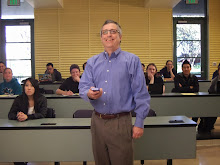...partly, it might be a guy named Ivgot Tenure (not his real name). I recently got in a flame war with a colleague in the marketing department that started with one of those emails Deans like to send out recognizing a faculty member who was awarded with an Endowed Professorship.
Ivgot Tenure responded to the dean, entire faculty, and the recipient of the appointment with a screed on another perk for administrators and nothing for peasants (his words) like him. I generally let these things go, but since this was far from the first one of his rants, I decided to call him on it (see embed on exchange below for the gory details if you wish...)
One important thing to note about the endowed position is that it was funded by a donor interested in the work being done by that professor or the position at the University. The budget situation for the California high ed system is in bad shape and unlikely to get materially better in the forseeable future. The mission of the CSU is to provide high-quality, affordable higher education. I won't debate the overall quality here, but the affordable piece is clearly challenged. State support has gone from close to 100% 15-20 years ago to close to 50% at undergraduate level and much less at graduate level today. My grad school alma mater (Anderson School at UCLA) was getting so little state funding, it said "to hell with it" and declared self sufficiency.
My experiential classes (ELAB and VLAB) require external funding as hard to justify small class sizes. Luckily, we have donors interested in supporting the work we are doing in entrepreneurship at SJSU.
Back to my buddy Ivgot Tenure. Unlike a commercial enterprise, he does not need to produce results. His job is safe due to our tenure system. I am a firm believer in the tenure system as it relates to academic freedom. However, a non-productive byproduct is that it provides a shield that protects faculty members who are not good educators nor producing valuable research. It is also interesting that Ivgot refers to himself as a peasant when it is actually the non-tenured junior faculty and adjuncts who could make that claim.
At the end of our tete-a-tete, I did what I should've done at the beginning. I blacklisted Ivgot so I don't have to see any more of his whining. I'll just focus on teaching and providing my students opportunties to work in the new venture ecosystem and build their own startups. Hopefully, many will be successful and able to fill some of the growing funding gap in the future.
We’ll Make Great Pets
2 weeks ago

